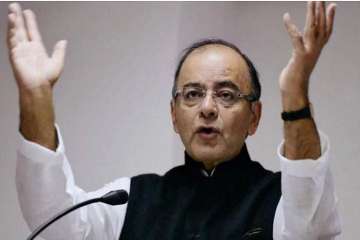Personal ambitions leading to degeneration of Congress ideology: Arun Jaitley
Delivering the first Atal Bihari Vajpayee Memorial Lecture at the India Ideas Conclave in New Delhi he asked whether Indira Gandhi or Rajiv Gandhi have ever gone to a congregation where 'Bharat ke tukde honge' slogan was raised.

Taking a swipe at Congress, Finance Minister Arun Jaitley on Saturday said the personal ambitions of the Congress leadership had led to the "degeneration of its ideology".
Delivering the first Atal Bihari Vajpayee Memorial Lecture at the India Ideas Conclave in New Delhi he asked whether Indira Gandhi or Rajiv Gandhi have ever gone to a congregation where 'Bharat ke tukde honge' slogan was raised.
Adding further, he said it was the "personal grievances and ambitions" which compelled the Congress party leadership to visit a congregation where anti-India slogans were raised.
Jaitley said the Congress, which was the dominant party of Indian politics for at least four decades post-Independence, developed dynastic tendencies after its second decade in power.
He said the Indian parliamentary democracy needed an alternative ideological and political pole without which it was incomplete.
"It was then that Atal Bihari Vajpayee put across his alternative view point whether it was Kashmir, Tibet or situation arising post the India-China war. The alternative voice was his.
"Indian democracy, because of the two political parties as national parties, became a viable parliamentary democracy... The principal party, from the weakness it showed in the second decade, would have succeeded in converting India more into a kingdom rather than even a dynastic democracy," Jaitley said.
Listing the challenges ahead for India, he said terrorism and insurgency would always remain one of the key threats.
The Minister said while India had been successful in eliminating terror, or reducing it substantially, in three parts of India -- Punjab, northeast and southern part of India - two challenges that still remained were Kashmir and Maoism.
In reply to a question, he said the living realities of Kashmir were that trouble was being fomented from across the border, some local groups had now joined in and the worst sufferers of this were the Kashmiri people.
He said in this battle, India needed the Kashmiri people on its side.
"It's a battle for sovereignty, a battle against separatists and terrorists. And the key is also held by people. Therefore, the approach has to be guided by the fact that those people are on our side and not with separatists," Jaitley said.
Taking a dig at the regional parties of Jammu and Kashmir, the Minister said they spoke one language in Srinagar and another in Delhi.
He said the politics of India had to send a clear message that "separatism will never be accepted by India and its mainstream".
Talking about Maoists, he said some mainstream parties were giving respectability to them.
Referring to the degrading quality of politics and public discourse, Jaitley said there was a disconnect between the aspirational new India that was emerging and the larger quality of politics.
Regarding Vajpayee's statesmanship and respect for his opponents, he said the best speech he ever gave was his obituary tribute to Jawaharlal Nehru in Parliament.
"We have to keep the spirit of democracy alive. And let's be clear: democracy can't be saved by those who are committed to dynasties, or those who are committed to the left-wing philosophy of violent overthrows of government, or those who believe in breaking India into pieces," he said.
Jaitley said the other challenges facing India were poverty and corruption. He added another issue that India had to deal with was to figure out a balance between fundamental rights and the right to religion.
"And these will remain issues which will throw up contemporary challenges which the society has to find the answer to," he said.
"The fundamental principles are very clear: India will never have a state religion, theocracy can never be, and India will always protect minorities."
( With inputs from IANS )